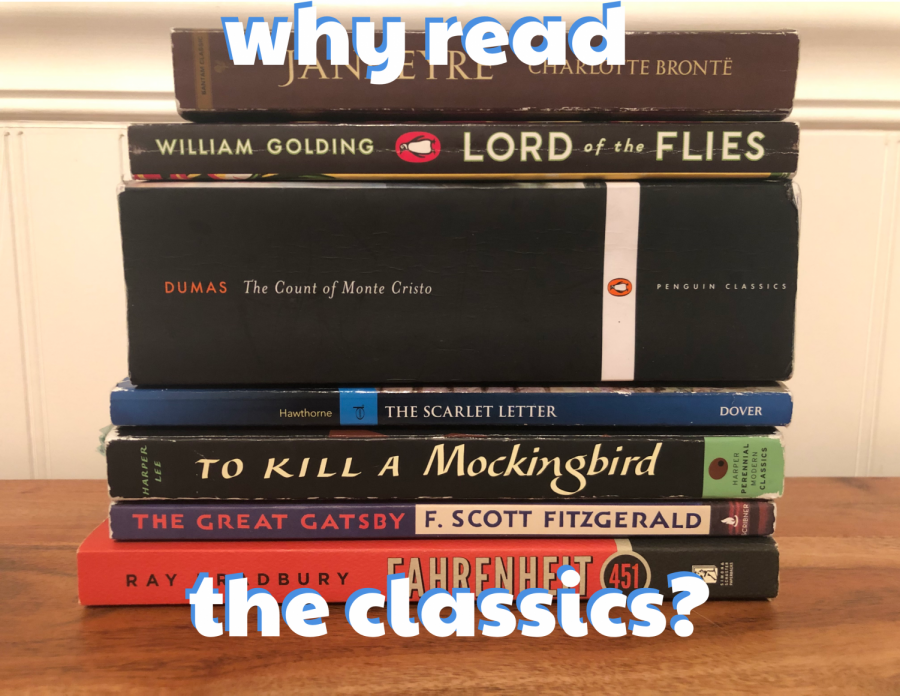The Classic Hate for Classics
Why are the classics taught time and time again, and is there any value in reading such an old boring book?
All of these classic novels are part of the WCA curriculum.
European and American literature seems to be a common theme from 7th grade all the way through college level English classes. Read it. Write it. Simple as that.
Any book which is considered a classic is something that has been passed through numerous hands throughout many generations. Classics often gain their true success long after initially being published. Even The Great Gatsby, which is often considered one of the greatest American novels, did not become popular until 25 years after it was first introduced.
“A book that has become a classic has gained merit over the years because it is the peak of the craft of writing, and universal to all people at all times. It is able to fully capture the human experience,” said Kyle Roff, 11th grade English teacher.
Also, the themes which are portrayed in these novels are especially easy for teachers to connect to teenagers. Often in high school, books in which the main character discovers their true identity are seen as the most important to teach.
“I love teaching Jane Eyre because Jane is at a pivotal time in her life where she is choosing her identity, making dreams for herself, and forming life goals—much like a typical 10th grade student today,” said Sara LaBarre, 10th grade English teacher and English Department Chair.
Many students will then ask, “why do we read such boring books?” Oftentimes classic literature is considered to be difficult to understand and not worth reading.
“‘Boring’ doesn’t really enter into it. That which scholars may find boring today was cutting edge in the past; that which we read today would be simplistic and incomprehensible to those from the past. Really, it comes down to the willingness of the scholar to encounter and seek understanding in a piece of literature that is unfamiliar,” said Ken Wolfe, 8th grade English teacher.
These books are also often used as references in culture, such as movies, songs, etc. The children’s movie Gnomeo and Juliet was created as a parody to Shakespeare’s Romeo and Juliet. Taylor Swift also references classic literature many times—in her song “Love Story,” she says, “cause you were Romeo, I was a Scarlet Letter and my daddy said stay away from Juliet,” referencing both The Scarlet Letter by Nathaniel Hawathorne and Romeo and Juliet.
Still, many claim that these books simply do not interest them.“I actually didn’t enjoy reading the classics in high school, but as an adult and teacher I can now see why they are important to have read. Although they still aren’t my favorite, I see how they give the opportunity to engage the world and offer a Christian worldview on topics that are so relevant in our culture,” said Heather Marsee, Middle School Principal and 7th grade English teacher. Being able to understand references today’s culture makes to these books gives Christians especially the opportunity to share their worldview on academic subjects.
Literacy is important in American society, which is why the majority of schools choose to include the classics in their curriculum. Many students, though, also beg the question of why there is not as much modern literature in most middle and high school English classes.
“Part of what makes a classic, a classic is that nothing has replaced them—they have been relevant to people even after hundreds of years,” said Roff. Also, modern literature tends lean on the more inappropriate side for a school setting.
Because of this, teachers find other ways to incorporate fun books into their classrooms. “I go through a list where every week I recommend a book that goes with the themes of the book we are reading in class,” said LaBarre. She thinks this has been a productive and fun way to get students interested in books she cannot necessarily teach during a class unit.
Over in the middle school hallway, they are also finding creative ways to get kids interested in reading. “I started something this year called ‘Quest for the Best’ where my students share their favorite books at the beginning of the year. Then, throughout the year, they are on a ‘quest’ to find their next best book and have a new favorite,” said Marsee. These exciting ways to get students interested in books help them get excited to read and prepare them to explore more challenging books in high school.
Classics may not be the most exciting (even for some English teachers), but they do incorporate valuable messages regarding the complexities of human experience. No matter an individual’s opinion on these books, their ability to endure through the decades is a testament to their superior level of writing. The classics will not be departing anytime soon, but there is a benefit in both learning about human identity, and connecting them with cultural references today. And who knows, maybe today’s modern favorites will become the next generation’s classic literature.




